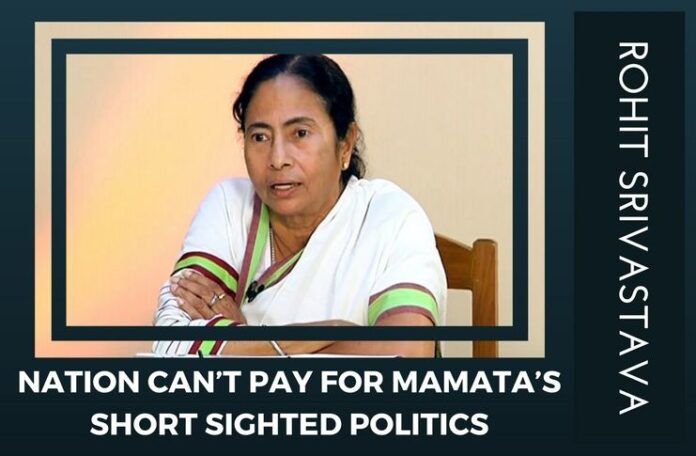
The political class will have to understand that they can’t be allowed to undermine national security for selfish gains
The communal riot in the Basirhat sub-division of West Bengal’s North 24 Parganas district has once again exposed the communal politics of chief minister ‘Mamata Banerjee’.This time the communal violence may have received wider media coverage but most certainly this is not the most violent one.
While talking to the media after the violence in Basirhat, chief minister Mamata Banerjee blamed the Central Government of conspiring against her government
The Kaliachak violence of January 3, 2016, in Malda district was a shocker of an incident, in which thousands, if not a lakh-plus mob, captured the town and went on the rampage, burning property and government buildings. The incident was so frightening that the media and the political class gave it a quiet burial.
Since the Trinamool Congress has come to power in the State, communal riots have become part of everyday life. Rural Bengal, especially in the border districts, is witnessing a systematic uprooting and forced exodus of the native Hindu population by Bangladeshi migrants. The poor marginal farmers of Bengal are in no position to defend themselves against an organised force backed by state machinery, which is displacing them. The situation is very grim and needs national attention.
The communal situation prevalent in the State could easily alter the national boundary in the sector. Under no circumstances can India afford to allow such a volatile situation on a religiously sensitive border. In a similar situation, way back in early 1980’s, the Central Government’s indecisiveness lost a generation of youth of Punjab to terrorism and the country had to pay a heavy price to bring the State back to normalcy.
The Omar Abdullah government’s velvet-glove approach towards militancy in Kashmir is the sole reason for the re-emergence of militancy in the Kashmir valley. With the Gorkhaland agitation crippling the hills and China attempting to capture more ground in the vulnerable chicken neck area, West Bengal has become the most susceptible border state of the country.
The silver lining for India is the Sheikh Hasina government in Dhaka which is fighting Islamists in that country. Bangladeshi migration in India is primarily driven by the Islamist’s agenda of creating a greater Bangladesh [that is, re-uniting Bengal]. It worth remembering that Mohammad Ali Jinnah had demanded the whole northeast of India and managed to extract the Hindu-Buddhist majority Chittagong Hills, which was the only link between the northeast and the Bay of Bengal. This made the northeast economically dependent on the rest of India.
The slow uprooting of Hindus from Bengal and Assam villages is a policy by Islamists to avoid a blatant Kashmir-like situation
While talking to the media after the violence in Basirhat, chief minister Mamata Banerjee blamed the Central Government of conspiring against her government and said, “We support social media, but the central government has an agenda. Sometimes it is to create a hate group and cause riots via Facebook. Yesterday’s incident is like that. There have been false posting of pictures which don’t have any link to reality.”
Blaming the Central Government will not help. Can Banerjee explain how she would have handled the situation if on January 3, 2017, the crowd had laid siege to Malda town? Did she have the wherewithal to recapture the town? If Malda, a border district with large-scale illegal poppy cultivation and printing of counterfeit currency, falls into the hands of extremists, it will be a national security challenge of epic proportions. This will be akin to what The Philippines is facing in the ISIS-held town of Marawi since May 23 this year.
This may appear farfetched, but few had imagined that Hindus would be driven out from the Kashmir valley. The slow uprooting of Hindus from Bengal and Assam villages is a policy by Islamists to avoid a blatant Kashmir-like situation. The slow process goes unchallenged and any associated violence is seen as a law and order issue, and not a strategic threat to the national boundary.
The question before the nation is: what is the way out? First and foremost, the Trinamool Congress government must be dismissed. Mamata Banerjee is a mass leader and street fighter can create a lot of trouble within the state. But it is time to expose her destructive self-serving politics which are damaging the nation. She deserves to be punished and we cannot afford another Kashmir or Punjab. India generally does not act proactively and then pays a heavy price for prevarication. But with new dispensation at the Centre and with the national spirit being at an all-time high, the risk is worth taking.
One should not look at any new administrative mechanism from a short-term political perspective but look for long-term benefits
Second, India needs an administrative mechanism in line with the uniform command in Kashmir and the North East, for fool-proof security within all border districts. The Centre could formulate this new mechanism for areas within a 50-km range of the international border. Under this system, the local police will take care of local and petty crimes while the larger security threats should be jointly handled by the Central Armed Police Forces (CAPF) and Army (depending on prevalent threat level).
Currently, the deployment of CAPFs is with the State Police, hence the Centre can only send CAPF to the State but has no control over their deployment. By creating a new framework, the Centre will be able to mitigate the adverse impact of the inefficiencies of local police and State politics on the security situation along international borders.
Getting States to agree to this will not be easy and there will resistance even in Parliament, but if the Modi Government can successfully execute demonetisation and GST, it is surely capable of managing this also. Kashmir and the Northeast already have a unified command system, while Uttarakhand and Himachal Pradesh have many special laws for border areas.
The biggest resistance will come from West Bengal and to some extent Punjab. But after the Pathankot terror attack of January 2016, experts questioned the loopholes in the security arrangements on the Punjab borders. Punjab has flourishing drug smuggling network. The terrorist who attacked Pathankot air base used the same drug smuggling network to infiltrate into India, and hence there is a powerful case for the Centre’s intervention.
One should not look at any new administrative mechanism from a short-term political perspective but look for long-term benefits. The security of border cannot be ignored for petty politics. The political class will have to understand that they can’t be allowed to undermine national security for selfish gains. The nation comes first.
Note:
1. The views expressed here are those of the author and do not necessarily represent or reflect the views of PGurus.
- An interview withLt Gen Narsimhan - July 17, 2017
- Nation can’t pay for Mamata’s short sighted politics - July 8, 2017
- Time for New Approach to Afghanistan - June 14, 2017











I agree to ur article. Place west Bengal under president’s rule and start systemic ethnic cleansing of illegal Muslim’s from Bangladesh.
Well timed article, requires serious reflection and discussion in mainstream Bengali political establishments, specially by the intellectual left leaning and liberal politicians. Look carefully into pros and cons of allowing Muslim migrants and jihadists being resettled in Bengal that was started since left front rule and went unabated last 30 years and continues till date. Who takes side of Hindu population in their own lands or is it no more their land now?
Excellent. food for thought